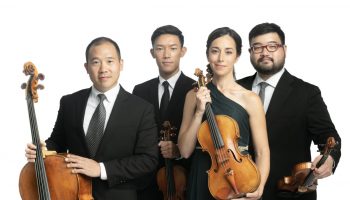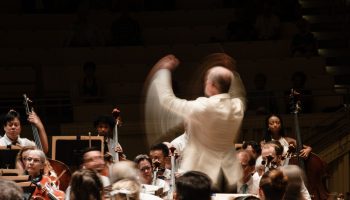
Liz Delillo
Staff Writer
Opera fanatics and newcomers alike have not one but two opportunities to see Wolfgang Mozart’s masterpiece Le Nozze di Figaro.
“Figaro — one of the most beloved operas in the repertory,” said Chautauqua Opera Conservatory Artistic Advisor Denyce Graves-Montgomery. “I personally never tire of it.”
The Chautauqua Opera Conservatory will perform Le Nozze di Figaro at 6:30 p.m. tonight in Fletcher Music Hall. This is the first full opera they will perform after the Opera Conservatory’s 25 voice students arrived for their season.
“It’s got just fantastic melodies — beautiful arias from Act I to Act IV,” Graves-Montgomery said. “We also hear this opera excerpted a lot so, for example, if you’re hearing auditions, or if you’re in concerts or recitals, you can often hear pieces of that opera, being performed in other capacities.”
Graves-Montgomery is an internationally celebrated mezzo-soprano; among other accolades, she has received a Grammy Award, an Eleanor Steber Music Award and a Marian Anderson Award. She also founded the Denyce Graves Foundation, a nonprofit at the nexus of social justice, American history and the arts, which she discussed as part of the Chautauqua Lecture Series on July 8.
“It’s a delightful opera with beautiful music, some very famous arias in it, and it’s such a lovely ensemble show,” Jonathan Beyer said. “… I’m really thrilled that this year we’re using the harpsichord for the recitatives, so that’s a really nice element we’ve been able to add to the equation for this performance.”
Beyer is the director of the Opera Conservatory as well as an acclaimed baritone. He was a National Finalist at the Metropolitan Opera National Council Competition and received the Marian Anderson Prize for Emerging Classical Artists.
“It’s been really neat to see this collaborative effort come together … making this beautiful music and telling this very interesting story, and it’s been wonderful to see that in a short period of time,” Beyer said. “… To see each singer having grown from the time in which they started the rehearsals is very inspiring; each one has stepped up and come a long way from the level in which they arrived.”

They have been working with myriad faculty members to prepare for performances tonight and Saturday.
“Our wonderful conductor is one of our vocal coaches, Joel Harder, and so he’s conducting the students and has been helping them with their musical preparation,” Beyer said. “… We have the wonderful Jeremy Chan who’s on the piano playing the opera, and then we have Donald Lee, who is on the harpsichord playing the recitative moments — so it’s a real group effort from the Conservatory on this one.”
In addition to those involved at the Opera Conservatory, others from the Chautauqua School of Music are collaborating for the production.
“We’re very excited to be collaborating with the piano department in the music schools,” Beyer said. “There are going to be two piano students that are playing a four-hand version of the overture,.”
He also highlighted the production’s director, Nathan Troup.
“He’s the perfect fit for the Conservatory because not only does he have high-profile professional credits, but he also works at the Boston Conservatory and is used to working with students — so it’s this perfect blend of professional approach and educational approach,” Beyer said. “… He’s been doing really wonderful steps with them. It’s not only staging the opera itself, but learning as they go.”
Within their six-week season, students at the Opera Conservatory have limited time when training for these performances, but spend months preparing for their summer repertoire before arriving at Chautauqua.
“When they arrived here, they did a table read with the director, which means instead of singing it, they’re going through all of their lines and making sure everyone has the same idea about the translation, because it’s sung in Italian,” Beyer said. “For most people, Italian is not their native language, so it was a lot of working through that translation and how to do it as if it were a play.”
As this production of Le Nozze di Figaro will be performed in Italian, Graves-Montgomery noted the importance of embracing that aspect of the artform.
“It was a wish of the late, great Marlena Malas to do everything in original language, and I agree with that, and I would like to keep that tradition,” Graves-Montgomery said. “It’s one of the few operas that I feel works well also in English, but we’re doing it in the original language.”
Malas was a renowned mezzo-soprano who led the School of Music Voice Program and then the Chautauqua Opera Conservatory for 44 years. During her time as director, the Voice Program combined with the Chautauqua Opera Company in 2022, forming the Chautauqua Opera Company and Conservatory. Because it is a musical training program, performing works in their original language is a significant element of the students’ education.
“For many of our students, this is their first time biting off a big chunk of that kind of recitative, so it’s been a big educational experience for a lot of them as well,” Beyer said. “… For many of them at their conservatory in school during the year, they’re not afforded this much stage time, and of course, I believe the best way to teach this craft is by doing it as opposed to sitting around talking about it.”
Across two performances with four acts each, students at the Opera Conservatory are sharing roles in Le Nozze di Figaro.
“Part of the training is that they have the opportunity to hear others work on it. I think that you can always learn from other performers,” Graves-Montgomery said. “… Whenever I was performing, and I shared a role with someone, … I always learned something from those other performances.”
Performing the opera in this format allows students to enjoy more time on stage. Moreover, rehearsing for a part shared with another person can provide invaluable insights for mastering that role.
“The singers have to learn the entire role, however, but we can then offer more opportunity to the singers by allowing them to each share an act — and then they learn the whole role as well and have the opportunity to coach it as well,” Graves-Montgomery said. “… That is something that I don’t think you would normally have if you were just doing the role straight through on your own.”
Since rehearsing for a given role alongside other artists cast in it provides that enhanced learning experience, students can delve deeper into that role within a single production.
“I think you have the opportunity to watch very, very different interpretations of it in real time, and you can learn from those; then, when you go out and you have that on your resume and hopefully, one day when you sing the whole role, you’ll have that information in your back pocket,” Graves-Montgomery said.
The breadth of the students’ preparatory training is derived not only from the unique casting format but from the very decision to perform an opera from Mozart.
“We’re starting with Mozart because it’s healthy and good, and it shows you what needs attention, and it will make everything else better,” Graves-Montgomery said. “It’s just beautifully, beautifully written for the voice.”
While Mozart’s music is widely celebrated among audiences for the performances it brings, his compositions are often favored among opera singers with respect to training.
“It’s also really good to sing. It’s very well written, and if you sing Mozart, your voice gets better. Your voice gets better because oftentimes, he writes for all of the voice types in what’s called the pasaggio,” Graves-Montgomery said. “… If you were doing a glissando — if you were doing a siren from all the way to the top — you would hear different registered breaks, and so he writes a lot in those register breaks.”
A passagio, or “passage” in Italian, is the transition area for voice registers, which are more commonly known as head or chest voices. Derived from the Italian verb glissare meaning “to glide,” a glissando is a technique in which notes are connected without each being sung individually. In order to perform a glissandro in a passagio, singers must be able to maintain that gliding technique between notes even in their voice register’s transition area.
“It really does allow the voice to line up, and then you can bring that to whatever other repertoire you might be working on,” Graves-Montgomery said. “If you have it on your resume, if you offer that in any audition, it will always be asked. You can have Puccini, you can have Verdi, you can have all of the many thousands of composers; if you have Mozart, nine times out of 10, the adjudicator will ask for the Mozart.”
Because Mozart’s work challenges their vocal technique in this way, training for it is integral for opera singers.
“Mozart also exposes the voice. It shows you the strength, and it shows you the weaknesses as well. It’s incredibly transparent,” Graves-Montgomery said. “… If you can sing that well, you can bring that discipline into other composers and other works.”
Beyond what Mozart’s Le Nozze di Figaro provides for students training to perform it, audiences both tonight and on Saturday have the opportunity to enjoy an exciting performance of this operatic classic.
“I tell my students that, whatever it is that they’re working on, I will often have them work on some Mozart before that piece that they’re working on because I think it’s like vocal medicine,” Graves-Montgomery said. “Not only is it a beloved opera and a real crowd pleaser, but it’s also healthy.”




